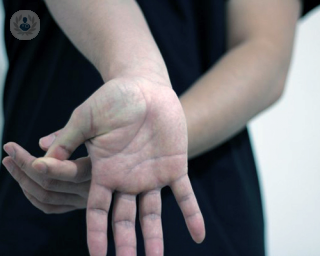What is carpal tunnel syndrome?
Carpal tunnel syndrome is a condition which causes numbness, tingling, or pain in the hand. It is a common condition which occurs due to compression of the median nerve in the wrist, which runs down the carpal tunnel, a narrow passage on the side of the wrist. The nerve controls movement in the thumb, and fingers except the little finger.
What are the symptoms?
Carpal tunnel symptoms normally progress over time, and do not come on suddenly. Usually symptoms start with numbness or tingling in the fingers (except the little finger, controlled by a different nerve) or thumb, which comes and goes. Symptoms can also include pain in the fingers, or even pain in the arm occurring between the hand and elbow. Sometimes symptoms become more apparent at night.
What causes carpal tunnel?
Carpal tunnel syndrome occurs when the carpal tunnel inside the wrist swells and compresses, or squeezes the median nerve. There are certain risk factors, including being overweight, having another illness such as diabetes or arthritis, and doing a job or having a hobby which involves repeatedly bending the wrist or gripping objects hard. Some women also develop carpal tunnel syndrome during pregnancy.
How can it be prevented?
Some measures can be taken to help prevent carpal tunnel syndrome from developing. Firstly, you can take care of your health in general, by maintaining a healthy weight, not smoking, and regularly exercising. You should also exercise your arm, hand, and finger muscles to keep them strong.
Try to avoid activities which place repeated pressure in the same area, and move your hand and wrist in a way that spreads the pressure over a larger area. Regularly switch hands and take breaks if performing tasks which involve a repetitive motion.
Treatment of carpal tunnel syndrome
Carpal tunnel syndrome can often be treated at home, as it clears up naturally in a few months, especially if you have it while pregnant. Some recommendations include:
- Wearing a wrist splint, which can help to keep your wrist straight, especially at night
- Cut down on repetitive movements which cause strain
- Try alternative treatments such as yoga, acupuncture, and hand exercises
- Try not to take painkillers as there is not much evidence that they help
If your symptoms get worse or do not go away, make an appointment to see your doctor. They may prescribe medication, usually in the form of steroid injections, or in more serious cases where carpal tunnel does not go away, they may refer you on to a specialist for surgery.
Surgery usually cures carpal tunnel syndrome, and is done as a day case procedure. After surgery, the hand and wrist will recover after about a period of a month.
11-13-2012 07-04-2024Carpal tunnel syndrome
Mr Sanjay Miranda - Orthopaedic surgery
Created on: 11-13-2012
Updated on: 07-04-2024
Edited by: Conor Dunworth
What is carpal tunnel syndrome?
Carpal tunnel syndrome is a condition which causes numbness, tingling, or pain in the hand. It is a common condition which occurs due to compression of the median nerve in the wrist, which runs down the carpal tunnel, a narrow passage on the side of the wrist. The nerve controls movement in the thumb, and fingers except the little finger.
What are the symptoms?
Carpal tunnel symptoms normally progress over time, and do not come on suddenly. Usually symptoms start with numbness or tingling in the fingers (except the little finger, controlled by a different nerve) or thumb, which comes and goes. Symptoms can also include pain in the fingers, or even pain in the arm occurring between the hand and elbow. Sometimes symptoms become more apparent at night.
What causes carpal tunnel?
Carpal tunnel syndrome occurs when the carpal tunnel inside the wrist swells and compresses, or squeezes the median nerve. There are certain risk factors, including being overweight, having another illness such as diabetes or arthritis, and doing a job or having a hobby which involves repeatedly bending the wrist or gripping objects hard. Some women also develop carpal tunnel syndrome during pregnancy.
How can it be prevented?
Some measures can be taken to help prevent carpal tunnel syndrome from developing. Firstly, you can take care of your health in general, by maintaining a healthy weight, not smoking, and regularly exercising. You should also exercise your arm, hand, and finger muscles to keep them strong.
Try to avoid activities which place repeated pressure in the same area, and move your hand and wrist in a way that spreads the pressure over a larger area. Regularly switch hands and take breaks if performing tasks which involve a repetitive motion.
Treatment of carpal tunnel syndrome
Carpal tunnel syndrome can often be treated at home, as it clears up naturally in a few months, especially if you have it while pregnant. Some recommendations include:
- Wearing a wrist splint, which can help to keep your wrist straight, especially at night
- Cut down on repetitive movements which cause strain
- Try alternative treatments such as yoga, acupuncture, and hand exercises
- Try not to take painkillers as there is not much evidence that they help
If your symptoms get worse or do not go away, make an appointment to see your doctor. They may prescribe medication, usually in the form of steroid injections, or in more serious cases where carpal tunnel does not go away, they may refer you on to a specialist for surgery.
Surgery usually cures carpal tunnel syndrome, and is done as a day case procedure. After surgery, the hand and wrist will recover after about a period of a month.


Treating your hand nerve irritation
By Miss Tanaya Sarkhel
2025-01-15
Carpal tunnel syndrome affects the median nerve in the wrist and hand, causing stiffness, reduced hand movement and discomfort. It is fairly common in adults and can be treated, either at home, or medically, depending on the severity. However, in some circumstances, diagnosis will show that what is suspected to be carpal tunnel syndrome, turns out to be another condition. Miss Tanaya Sarkhel, an experienced orthopaedic surgeon, discusses treatment options for hand nerve irritation. See more


Hand pain at night? Carpal tunnel syndrome explained
By Ms Anna Moon
2025-01-15
Hand pain at night and difficulty with gripping things could be an indication of carpal tunnel syndrome, a nerve condition which affects 7-16% of people in the UK. Ms Anna Moon, leading othopaedic surgeon, explains how carpal tunnel syndrome is diagnosed and how it can be treated. See more


What happens if carpal tunnel syndrome isn’t treated?
By Miss Tanaya Sarkhel
2025-01-15
Carpal tunnel syndrome (CTS) is a common condition that requires treatment to maintain different functions of the hand and fingers. Read on to find out exactly why treatment for CTS is so important, as explained by Miss Tanaya Sarkhel. See more


Carpal tunnel syndrome: warning signs, tests and common treatments
By Mr James Nicholl
2025-01-15
There may be warning signs in your day-to-day life which indicate the onset of carpal tunnel syndrome. Mr James Nicholl explains the various tests he commonly performs and which treatments are available for this condition. See more
Experts in Carpal tunnel syndrome
-
Mr Patrick Gillespie
Plastic surgeryExpert in:
- Warts
- Carpal tunnel syndrome
- Dupuytren’s contracture
- Skin cancer
- Cysts
- Hand arthritis
-
Mr Andrew Logan
Orthopaedic surgeryExpert in:
- Carpal tunnel syndrome
- Dupuytren’s contracture
- Wrist surgery
- Trigger finger
- Hand arthritis
- Hand surgery
-
Mr Ravi Badge
Orthopaedic surgeryExpert in:
- Carpal tunnel syndrome
- Cubital tunnel syndrome
- Trigger finger
- Thumb Osteoarthritis
- Epicondylitis (tennis elbow)
- Rotator cuff injury
-
Mr Philip Mathew
Orthopaedic surgeryExpert in:
- Wrist arthroscopy
- Carpal tunnel syndrome
- Hand arthritis
- Dupuytren’s contracture
- Wrist surgery
- Hand fracture
-
Mr Stephen Lipscombe
Orthopaedic surgeryExpert in:
- Hand surgery
- Wrist surgery
- Carpal tunnel syndrome
- Trigger finger
- Fracture
- Arthroscopy of small joints
- See all

London International Patient Services (LIPS)
London International Patient Services (LIPS)
5 Devonshire Place, W1G 6HL
No existe teléfono en el centro.
By using the telephone number provided by TOP DOCTORS, you automatically agree to let us use your phone number for statistical and commercial purposes. For further information, read our Privacy Policy
Top Doctors

Cleveland Clinic Moorgate Outpatient Centre
Cleveland Clinic Moorgate Outpatient Centre
55 Moorgate, EC2R 6BH
No existe teléfono en el centro.
By using the telephone number provided by TOP DOCTORS, you automatically agree to let us use your phone number for statistical and commercial purposes. For further information, read our Privacy Policy
Top Doctors

Beaumont Hospital - part of Circle Health Group
Beaumont Hospital - part of Circle Health Group
Old Hall Clough, Chorley New Rd, Lostock, BL6 4LA
No existe teléfono en el centro.
By using the telephone number provided by TOP DOCTORS, you automatically agree to let us use your phone number for statistical and commercial purposes. For further information, read our Privacy Policy
Top Doctors
-
London International Patient Services (LIPS)
5 Devonshire Place, W1G 6HL, W1G Marylebone LondonExpert in:
- Orthopaedic spinal surgery
- Plastic surgery, reconstructive and aesthetics
- Hand and wrist
- Otolaryngology
- Foot and ankle
- Knee
-
Cleveland Clinic Moorgate Outpatient Centre
55 Moorgate, EC2R 6BH, Central LondonExpert in:
- Digestive
- Cardiology
- Dermatology
- Diagnostic Imaging
- Diagnostics
- Obstetrics and Gynaecology
-
Beaumont Hospital - part of Circle Health Group
Old Hall Clough, Chorley New Rd, Lostock, BL6 4LA, BoltonExpert in:
- Audiology
- General Surgery
- Orthopaedic surgery
- Dermatology
- Pain management
- Hernia
- See all
- Most viewed diseases, medical tests, and treatments
- Alzheimer's disease
- Cluster headaches
- Tension headache
- Chronic headache
- Ulnar nerve entrapment
- Peripheral nerve block
- Peripheral neuropathy
- Facial feminisation surgery
- Migraine
- Paediatric rheumatology









